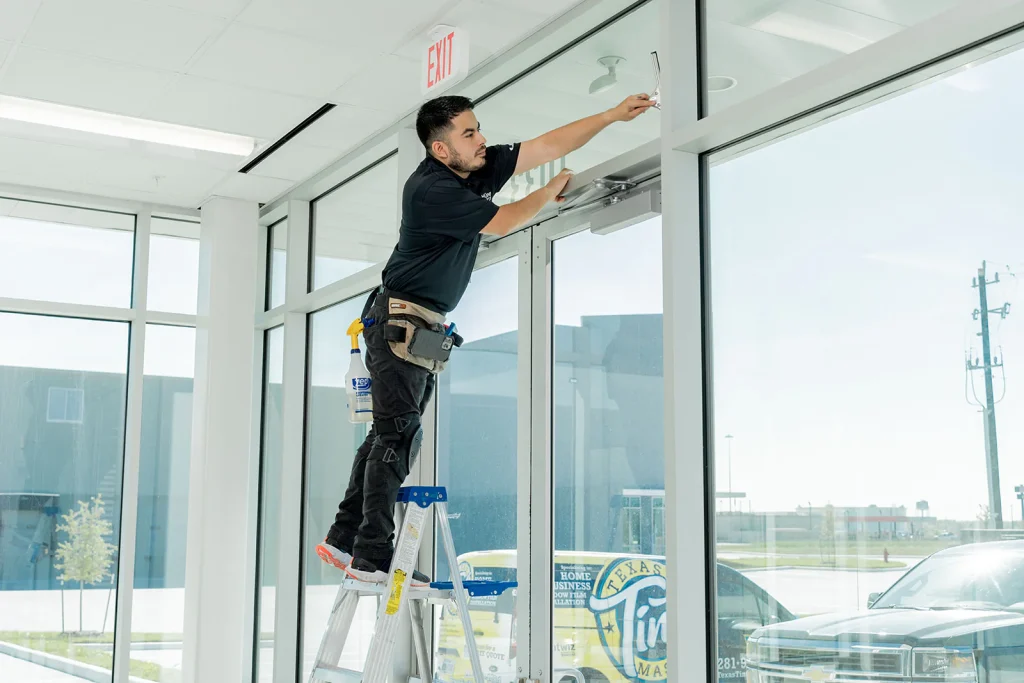Commercial window tinting offers several benefits beyond aesthetics, particularly in reducing energy costs for businesses. One significant advantage is its ability to regulate indoor temperatures more efficiently. By applying a thin, solar control film to windows, businesses can minimize heat gain during hot weather and retain warmth during colder seasons. This thermal insulation effect reduces the workload on HVAC systems, leading to lower energy consumption and decreased utility bills. Moreover, commercial window tinting helps mitigate the effects of solar heat gain, which is a major contributor to increased cooling costs in buildings with extensive glass surfaces. The solar control films used in tinting can block a significant portion of the sun’s infrared radiation and visible light that enters through windows. By doing so, they prevent overheating of interior spaces, thus reducing the need for air conditioning. This not only saves on energy but also enhances comfort for occupants by maintaining more stable indoor temperatures throughout the day. Another aspect of energy efficiency brought about by window tinting is its impact on lighting expenses.

Tinted windows can effectively reduce glare caused by direct sunlight, which often necessitates artificial lighting to maintain comfortable working conditions indoors. By diffusing light more evenly and minimizing glare, tinted windows create a more ambient environment that requires less artificial lighting during daylight hours. This translates to lower electricity usage and reduced lighting costs for businesses, particularly in areas with abundant natural light. In addition to the direct energy savings, commercial window tinting contributes to overall sustainability efforts. By decreasing energy consumption, businesses can lessen their carbon footprint and environmental impact. This aligns with growing corporate initiatives towards sustainability and can enhance a company’s reputation as an environmentally responsible entity. Furthermore, window tinting enhances the longevity and durability of interior furnishings and materials. UV rays from the sun can cause fading and deterioration of carpets, furniture, and artwork over time. Solar control films used in window tinting effectively block up to 99% of harmful UV rays, thus preserving the integrity and extending the lifespan of interior assets. This can result in cost savings by reducing the frequency of furniture replacement and refurbishment projects.
Beyond practical benefits, window tinting can also contribute to the aesthetics privacy of commercial spaces and visit site https://www.proshieldwindowtinting.com/commercial-window-tinting/. Tinted windows provide a uniform appearance to buildings by reducing the visibility of interior elements from the outside. This can be particularly advantageous for businesses located in high-traffic areas or sensitive environments where confidentiality and discretion are valued. In conclusion, the investment in commercial window tinting offers multifaceted advantages for businesses seeking to reduce operational costs and enhance sustainability efforts. From significant energy savings through reduced HVAC and lighting expenses to preserving interior furnishings and improving comfort, window tinting proves to be a cost-effective and environmentally friendly solution. By regulating indoor temperatures, minimizing UV exposure, and improving privacy, businesses can create more comfortable and efficient environments for employees and clients alike. As energy costs continue to rise and environmental considerations become increasingly important, commercial window tinting emerges as a practical and beneficial choice for modern businesses aiming to optimize their operational efficiency while reducing their carbon footprint.